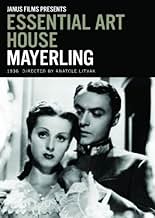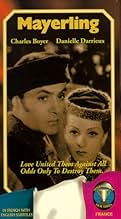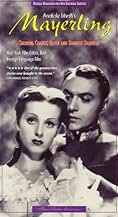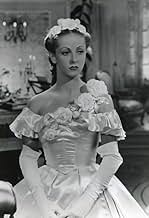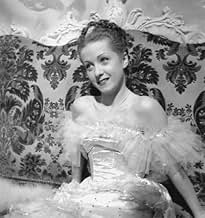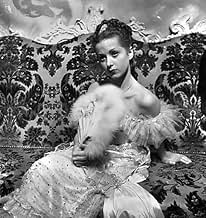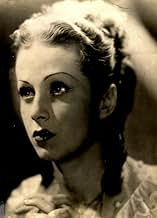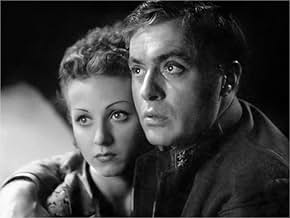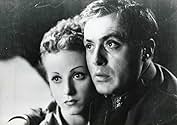Rodolfe, Crown Prince of Austria, is fettered on all sides. He's bored; his father, the emperor, is domineering; his politics are more liberal than his father's, but he knows his views carry... Read allRodolfe, Crown Prince of Austria, is fettered on all sides. He's bored; his father, the emperor, is domineering; his politics are more liberal than his father's, but he knows his views carry no weight. He agrees to marry a princess to sire an heir, then spends his nights as a pla... Read allRodolfe, Crown Prince of Austria, is fettered on all sides. He's bored; his father, the emperor, is domineering; his politics are more liberal than his father's, but he knows his views carry no weight. He agrees to marry a princess to sire an heir, then spends his nights as a playboy. In 1888, he meets Marie Vetsera, 17, a baroness' daughter. She is resolute, smitten,... Read all
- Awards
- 3 wins & 1 nomination total
- La baronne Vetsera
- (as Marthe Regnier)
- La cousine de Marie
- (as Assia)
- Une fille
- (as Ribès)
- Szeps
- (as Bergeron)
- Le chef de la police
- (as Sokoloff)
- Le premier policier
- (as Aimos)
- Le second policier
- (as Siméon)
Featured reviews
In this French-language version by Ukranian director Anatole Litvak, we get a highly-romanticised version of the story with Charles Boyer and Danielle Darrieux as the star-crossed but ill-fated lovers.
The direction throughout is stylish and tasteful, Litvak impressing in his recreation of the Viennese Court with its surface splendour barely concealing the jostling for position and rumour-mongering beneath the facade. Boyer and Darrieux are excellent in their lead roles, his character the reforming, rebellious heir to the throne, unhappy in his arranged marriage and she the youthful, highly-impressionable innocent caught up in the first great passion of her life.
The concluding climax is sensitively and humanely depicted too with my only major criticisms of the film being an over-reliance on the use of the no-doubt in-vogue montage sequences and a tendency to slightly overstay the camera's welcome in certain scenes.
Nevertheless, this was a fine retelling of the notorious scandal and it's no surprise that its artistic and commercial success lured director Litvak to Hollywood where he enjoyed a distinguished career for many years.
Indeed Emperor Franz Joseph lived on and on and on. He did not die until 1916 and the Empire would die with the end of World War I when so many new states were created in Europe. But when people do start getting old the succession in the dynasty becomes important.
Charles Boyer plays the dissolute and dissipated Crown Prince Rudolf who always gets a following whether he wants it or not in any monarchy. He's got more liberal views than his father played here by Jean Dax. What's not covered here is that Franz Joseph when he assumed the throne in 1848 was a rather serious minded youth of the age of 17, a total contrast to his kid. It made for continual conflict exacerbated by court politics.
The Crown Prince was more interested in letting the good times roll like there was no tomorrow. The Emperor has already arranged a match which the Prince has reluctantly agreed to as per his duty to the state. But then he meets Danielle Darrieux who plays Marie Vetsera who is of minor nobility not quite up to Hapsburg standards. After that he wants only to be with her. And she wants only him, not even the crown if he has to give it up.
Rudolf was a momma's boy in every sense of the word. The Empress Elizabeth married Franz Joseph and she was a wild child herself. Her story is covered in the Grace Moore/Franchot Tone movie The King Steps Out. Although she's at court here in this film, most of the years of her reign she lived apart from the Emperor partaking of the various resorts at places like Baden-Baden and Biarritz. Actress Gabrielle Dorziat plays Sissi and she sympathizes with her son, but not much she can do. Boyer and Dorziat have a very emotional scene covering that.
Darrieux all wide eyed and innocent does a wonderful job as the luckless Marie Vetsara. Boyer scores well as the tragic Rudolf who would just not settle down to his responsibilities.
With the British monarchy crisis in the news in America and everywhere else but the British Empire, Mayerling found an interested audience in 1936. Anatole Litvak directed it and he, Boyer, and Darrieux would be in America soon enough. Boyer was already here, but returned to France for this film. No doubt he was cast for box office reasons in the foreign markets, most especially the American one.
All of them delivered a fine film.
Recently, I was able to obtain a copy of the this movie and saw it again after 20 years. The movie did not disappoint and I can say that it is one of the best movies ever. It must have been such a sensation when first released in 1936.
Did you know
- TriviaOne of the first foreign films with sound to become a hit in the United States. It made an international star out of Charles Boyer.
- ConnectionsFeatured in Scissors (1991)
Details
Box office
- Gross US & Canada
- $240,000
- Runtime
- 1h 36m(96 min)
- Color
- Aspect ratio
- 1.33 : 1

